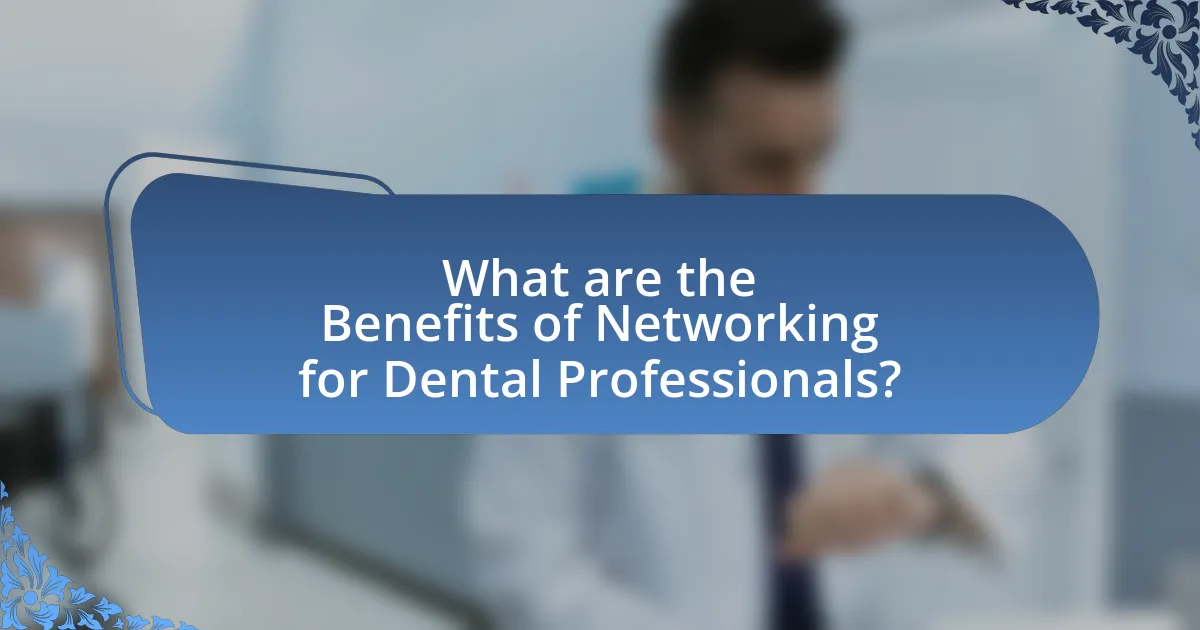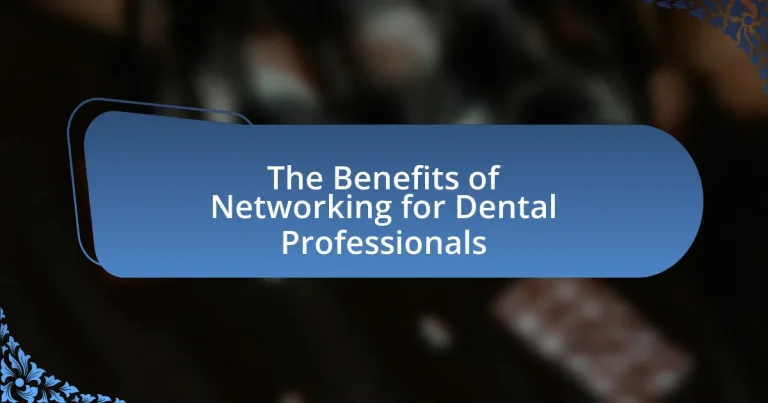The article focuses on the benefits of networking for dental professionals, highlighting its role in career advancement, knowledge sharing, and collaboration. It discusses how networking enhances professional growth by providing access to mentorship, improving communication and collaboration skills, and facilitating job opportunities. The article also emphasizes the importance of networking in building patient relationships, gaining referrals, and fostering trust and loyalty among patients. Additionally, it outlines strategies for effective networking, common challenges faced by dental professionals, and practical tips to maximize networking benefits within the community and industry.

What are the Benefits of Networking for Dental Professionals?
Networking provides dental professionals with opportunities for career advancement, knowledge sharing, and collaboration. By connecting with peers, dental professionals can gain insights into best practices, emerging technologies, and industry trends, which enhances their clinical skills and business acumen. Additionally, networking can lead to referrals and partnerships, ultimately expanding their patient base and practice growth. Research indicates that professionals who actively network are more likely to find job opportunities and achieve higher levels of career satisfaction, as they benefit from shared experiences and mentorship within the dental community.
How does networking enhance professional growth in dentistry?
Networking enhances professional growth in dentistry by facilitating access to mentorship, collaboration opportunities, and industry insights. Dental professionals who engage in networking can connect with experienced colleagues, which can lead to guidance on best practices and career advancement. Additionally, networking allows for collaboration on research projects and community initiatives, fostering innovation and improving patient care. According to a study published in the Journal of Dental Education, 70% of dental professionals reported that networking significantly contributed to their career development by providing valuable resources and connections within the field.
What specific skills can dental professionals gain through networking?
Dental professionals can gain communication, collaboration, and business management skills through networking. Effective communication skills are enhanced as professionals engage with peers, patients, and industry leaders, allowing them to articulate ideas and share knowledge more clearly. Collaboration skills improve as dental professionals work with others on interdisciplinary teams, fostering a better understanding of diverse perspectives and approaches to patient care. Additionally, networking provides insights into business management practices, including marketing strategies and financial planning, which are crucial for running a successful dental practice. These skills are validated by studies showing that professionals who actively network report higher levels of job satisfaction and career advancement opportunities.
How does networking contribute to career advancement in dentistry?
Networking significantly contributes to career advancement in dentistry by facilitating professional relationships that can lead to job opportunities, mentorship, and collaboration. Dental professionals who actively engage in networking can access a broader range of resources, including referrals and recommendations, which are crucial for building a successful practice. Research indicates that approximately 70% of jobs are found through networking, highlighting its importance in career progression. Additionally, networking events and professional organizations provide platforms for dentists to share knowledge, stay updated on industry trends, and enhance their skills, further solidifying their career growth.
Why is networking important for building patient relationships?
Networking is crucial for building patient relationships because it fosters trust and communication between dental professionals and their patients. Establishing connections through networking allows dental professionals to share knowledge, experiences, and resources, which enhances the overall patient experience. Research indicates that patients are more likely to remain loyal to providers who engage in community networking, as it demonstrates commitment to their well-being and fosters a sense of belonging. For instance, a study published in the Journal of Dental Research found that practices with strong community ties reported higher patient satisfaction and retention rates.
How can networking help dental professionals gain referrals?
Networking helps dental professionals gain referrals by establishing relationships with other healthcare providers and community members who can recommend their services. Through networking, dental professionals can connect with general practitioners, specialists, and local businesses, creating a referral network that enhances visibility and credibility. Research indicates that 85% of new patients come from referrals, highlighting the importance of personal connections in driving patient acquisition. By actively participating in professional organizations and community events, dental professionals can foster trust and rapport, leading to increased referral opportunities.
What role does networking play in patient trust and loyalty?
Networking significantly enhances patient trust and loyalty by fostering relationships between dental professionals and their patients. When dental professionals engage in networking, they build a community that promotes shared knowledge, referrals, and support, which directly impacts patient perceptions. Research indicates that patients are more likely to trust providers who are well-connected within their professional community, as this suggests a higher level of expertise and reliability. For instance, a study published in the Journal of Dental Research found that 70% of patients prefer to choose a dentist based on recommendations from trusted sources, highlighting the importance of networking in establishing credibility. Thus, effective networking not only strengthens professional ties but also cultivates a trustworthy environment that encourages patient loyalty.
What opportunities does networking provide for collaboration?
Networking provides dental professionals with opportunities for collaboration by facilitating connections with peers, mentors, and industry leaders. These connections enable the sharing of knowledge, resources, and best practices, which can lead to joint ventures, research partnerships, and referral networks. For instance, a study published in the Journal of Dental Education found that collaborative networks among dental professionals significantly enhance clinical skills and patient care outcomes. This evidence underscores the value of networking in fostering collaborative efforts that ultimately benefit both practitioners and their patients.
How can dental professionals collaborate with other healthcare providers?
Dental professionals can collaborate with other healthcare providers through interdisciplinary care teams, referrals, and shared patient management systems. By participating in interdisciplinary care teams, dental professionals can contribute to comprehensive treatment plans that address both oral and systemic health issues, enhancing patient outcomes. Referrals to and from other healthcare providers, such as physicians and specialists, facilitate a holistic approach to patient care, ensuring that dental and medical needs are met concurrently. Additionally, utilizing shared patient management systems allows for seamless communication and coordination of care, which is essential for managing complex cases. Studies indicate that such collaboration can lead to improved health outcomes, as evidenced by research published in the Journal of Dental Research, which highlights the positive impact of integrated care on patient satisfaction and health metrics.
What are the benefits of interdisciplinary networking in dentistry?
Interdisciplinary networking in dentistry enhances patient care, fosters collaboration, and promotes professional development. By connecting dental professionals with specialists in fields such as medicine, psychology, and nutrition, practitioners can gain insights into comprehensive treatment approaches that address the multifaceted needs of patients. For instance, collaboration with medical professionals can lead to better management of systemic conditions that affect oral health, improving overall patient outcomes. Additionally, interdisciplinary networking facilitates the sharing of best practices and innovative techniques, which can lead to advancements in dental procedures and technologies. Studies have shown that such collaborative efforts can reduce treatment times and improve patient satisfaction, highlighting the tangible benefits of networking across disciplines in the dental field.
How can dental professionals effectively network within their community?
Dental professionals can effectively network within their community by actively participating in local health fairs, community events, and professional organizations. Engaging in these activities allows dental professionals to connect with potential patients and other healthcare providers, fostering relationships that can lead to referrals and collaborations. For instance, a study published in the Journal of Dental Education highlights that networking through community involvement significantly increases visibility and trust among local populations, ultimately enhancing practice growth.
What strategies can enhance networking efforts for dental professionals?
Dental professionals can enhance their networking efforts by actively participating in industry conferences and workshops. Engaging in these events allows dental professionals to meet peers, share knowledge, and establish connections that can lead to referrals and collaborations. According to a survey by the American Dental Association, 70% of dental professionals reported that attending conferences significantly expanded their professional network. Additionally, utilizing social media platforms like LinkedIn can facilitate ongoing communication and relationship-building with other professionals in the field. This approach not only increases visibility but also fosters a sense of community among dental practitioners.
How can social media be utilized for networking in dentistry?
Social media can be utilized for networking in dentistry by enabling dental professionals to connect, share knowledge, and collaborate with peers globally. Platforms like LinkedIn, Facebook, and Instagram allow dentists to join specialized groups, participate in discussions, and showcase their work, thereby enhancing their professional visibility. According to a survey by the American Dental Association, 70% of dentists reported using social media for professional networking, highlighting its effectiveness in fostering relationships and sharing best practices within the dental community.
What are the best practices for attending dental conferences and events?
The best practices for attending dental conferences and events include thorough preparation, active participation, and effective follow-up. Preparing involves researching the conference agenda, identifying key speakers, and setting specific goals for what to achieve during the event. Active participation means engaging in discussions, asking questions, and networking with peers to build professional relationships. Following up after the event is crucial; this includes reaching out to new contacts, sharing insights gained, and maintaining connections through social media or email. These practices enhance learning opportunities and foster valuable professional networks, which are essential for career growth in the dental field.
What are the common challenges faced in networking for dental professionals?
Dental professionals commonly face challenges in networking, including time constraints, lack of access to relevant events, and difficulties in establishing meaningful connections. Time constraints arise due to busy schedules filled with patient care and administrative tasks, limiting opportunities for networking. Additionally, many dental professionals may find it challenging to locate industry-specific events or forums that cater to their interests and specialties. Establishing meaningful connections can also be difficult, as professionals may struggle with initiating conversations or finding common ground with peers. These challenges can hinder the potential benefits of networking, such as collaboration, referrals, and professional growth.
How can dental professionals overcome networking anxiety?
Dental professionals can overcome networking anxiety by preparing in advance and practicing effective communication skills. Preparation involves researching the event, understanding the attendees, and setting specific networking goals, which can reduce uncertainty and boost confidence. Practicing communication skills, such as active listening and engaging in small talk, can help ease interactions. Studies show that familiarity with networking scenarios can significantly reduce anxiety levels, as individuals become more comfortable with the process over time. Engaging in role-playing exercises or attending workshops can further enhance these skills, making networking more approachable and less intimidating.
What strategies can help in maintaining professional connections?
To maintain professional connections, dental professionals should engage in regular communication, attend industry events, and utilize social media platforms. Regular communication, such as follow-up emails or phone calls, reinforces relationships and keeps connections active. Attending industry events, like conferences or workshops, provides opportunities for face-to-face interactions, which strengthen bonds. Utilizing social media platforms, particularly LinkedIn, allows for ongoing engagement and sharing of relevant content, keeping connections informed and involved. These strategies are effective as they foster consistent interaction, which is crucial for sustaining professional relationships in the dental field.
What practical tips can dental professionals implement to maximize networking benefits?
Dental professionals can maximize networking benefits by actively participating in industry events, joining professional organizations, and utilizing social media platforms. Engaging in conferences and workshops allows dental professionals to meet peers, share knowledge, and establish connections that can lead to referrals and collaborations. Membership in organizations like the American Dental Association provides access to resources and networking opportunities with other professionals in the field. Additionally, leveraging social media platforms such as LinkedIn enables dental professionals to showcase their expertise, connect with colleagues, and engage with potential clients, thereby expanding their professional network. These strategies are supported by research indicating that networking significantly enhances career opportunities and professional growth in the dental industry.


